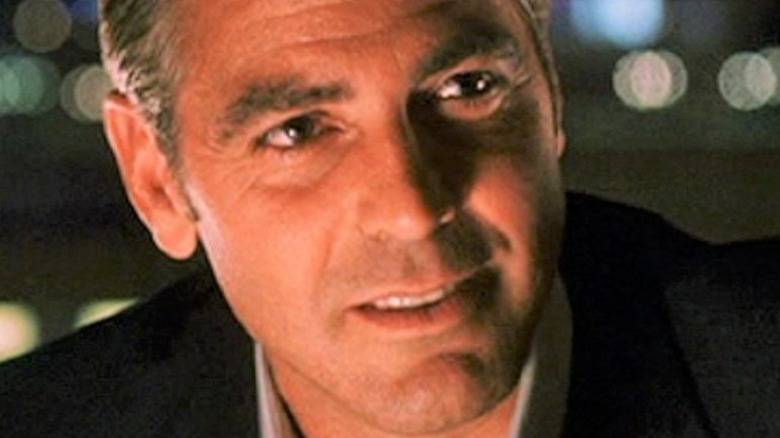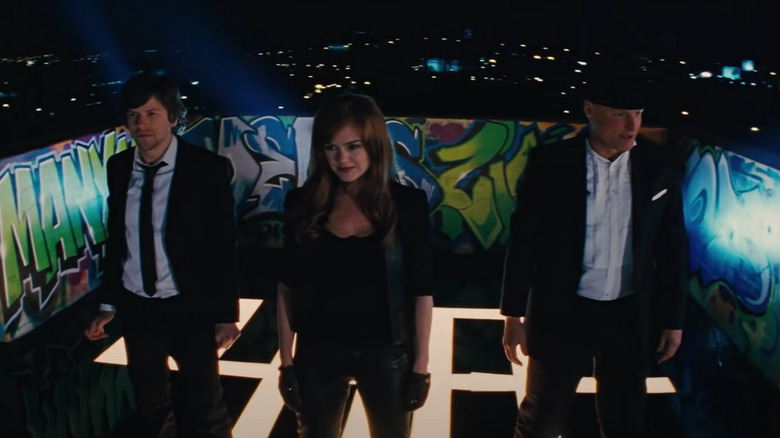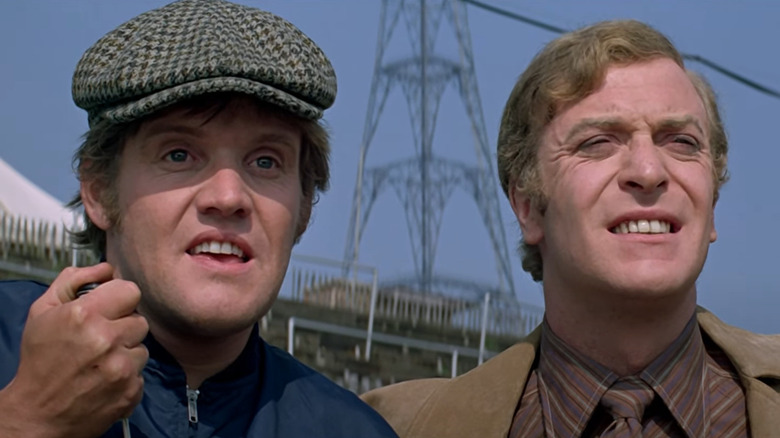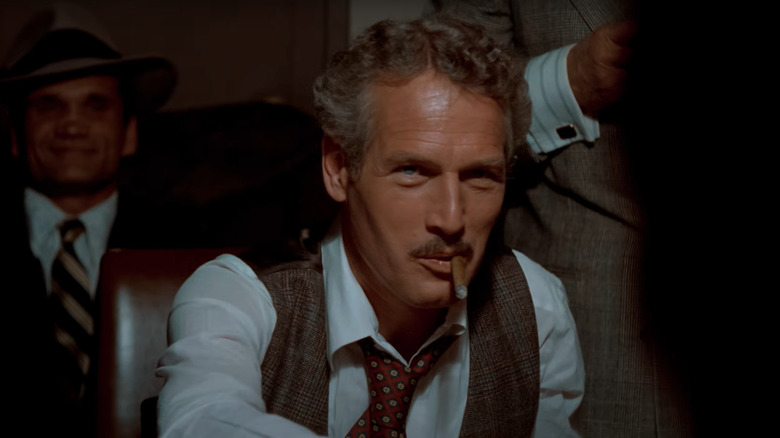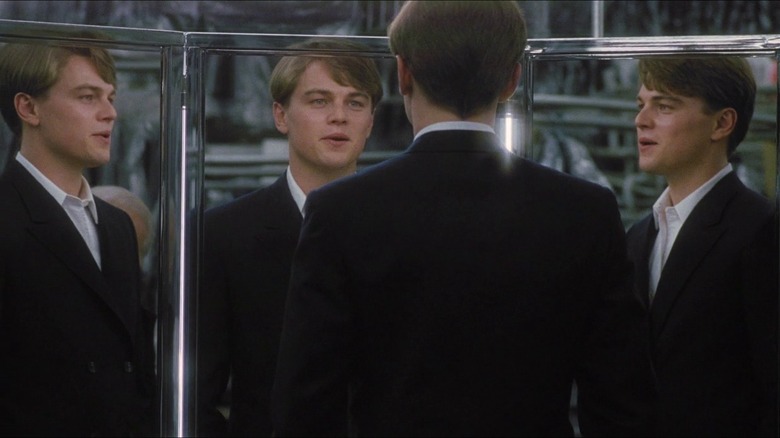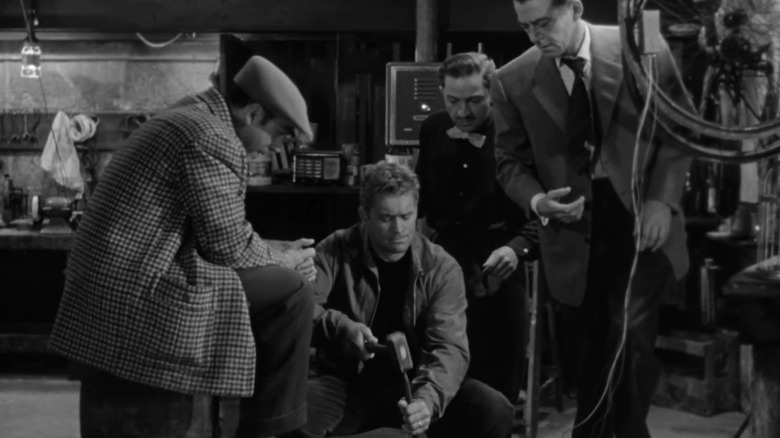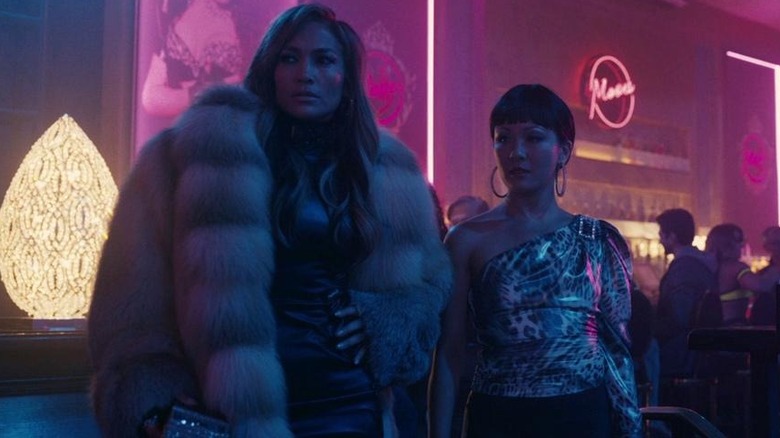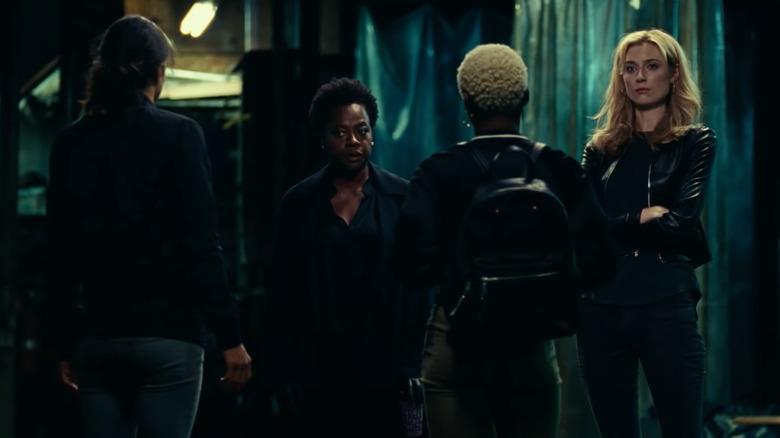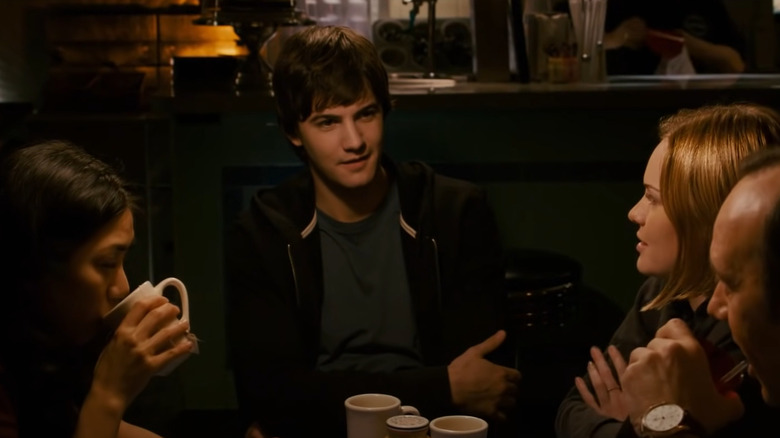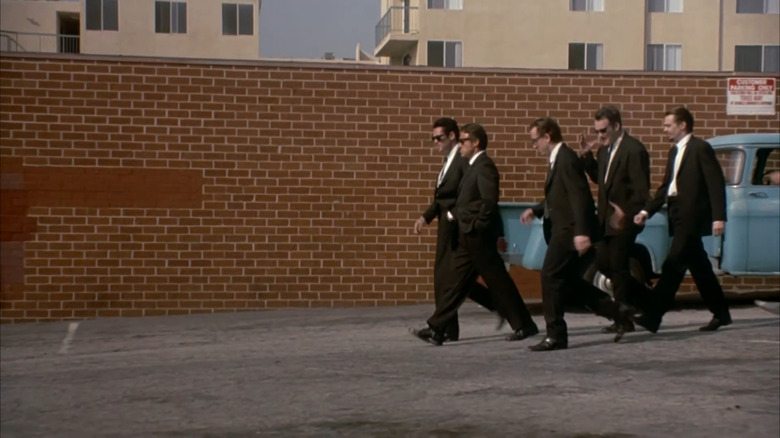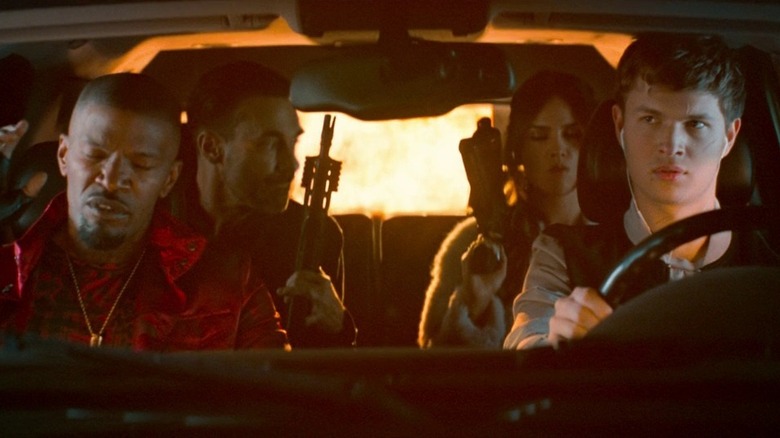10 Movies Like Ocean's 11 You Need To See
A remake of the slick Rat Pack heist movie from 1960, Steven Soderbergh's 2001 version of "Ocean's Eleven" is a star-packed, stylish crime comedy with one of the best ensemble casts on screen. Headed up by Danny Ocean (George Clooney) and his old friend Rusty Ryan (Brad Pitt), the film focuses on a rag-tag group of con artists and criminals — each with a unique skill or talent to contribute — planning an elaborate con targeting three major Las Vegas casinos.
Heist movies or crime capers have been a cinematic staple since the 1950s, with "The Asphalt Jungle" often cited as the first example of the genre. Even more than 70 years later, they're still big business, and it's one of those genres that feels wonderfully nostalgic while also modern and fresh — with new technologies employed to make the heists bigger, better, and more intricate.
This one-upmanship can be seen in the "Ocean's" films alone, with the 2001 film followed by the sequels "Ocean's Twelve," "Ocean's Thirteen," and — just to break the sequential numbering — "Ocean's 8." Each of these films has seen the stakes raised and the dramatic tension increased. What keeps us coming back to heist movies is this idea that it could all go wrong incredibly quickly despite all the meticulous planning, and this proximity to danger keeps us on the edge of our seats. If you loved "Ocean's 11," these are 10 more movies that you need to check out.
Now You See Me
Heists and magic might not be the first two things you associate with each other, but 2013's "Now You See Me" proved it could be a winning combination. Successfully pulling off a con or a magic trick requires sleight of hand and immense skill, with a certain degree of bluffing and trickery tying them together as well.
Starring Jesse Eisenberg, Woody Harrelson, Isla Fisher, and Dave Franco as "The Four Horsemen," "Now You See Me" gives a fresh twist to the genre with the addition of illusions. In films such as "Ocean's 11," you'll often see the characters explain their plan before they go ahead, and while things inevitably go wrong along the way, the audience is with them in terms of knowing what to expect. In this film, this idea is flipped as we see the trick and are left scratching our heads for a while until, eventually, the magicians reveal their secrets.
While these films are essentially about criminals, a key component is a likability to the characters — something the casts of "Ocean's 11" and "Now You See Me" have in common. The Four Horsemen are not only charismatic and highly skilled, but their tricks target wealthy banks and unscrupulous business owners, putting the money back into the pockets of regular people. While elaborate heist illusions might not be the best way to go about it, this "Robin Hood" motivation means we — like their adoring crowds — are a captive audience.
The Italian Job (1969)
Combining a thrilling gold heist, car chases, and beautiful Italian scenery, "The Italian Job" is one of the best examples of the genre and the standard that many subsequent films would aspire to. Michael Caine is Charlie Croker, an ex-prisoner who takes on the intimidating job of leading an elaborate heist to steal gold bullion from an armored truck. "The Italian Job" is a quintessentially British comedy crime caper, and it's positively packed with unforgettable moments and iconic quotes.
Despite there being more than 30 years between "Ocean's 11" and "The Italian Job," they share similar qualities with their charismatic leading men in George Clooney and Michael Caine, respectively, and the effortless "cool" factor that both films have in abundance. Driving forms a large part of "The Italian Job," and you'll never see the classic British Mini Cooper car look as stylish as it does here, particularly in the narrow streets of Turin.
While the film is a fun and thrilling ride from start to finish, it's perhaps the final scene that sticks with people the most, closing with a legendary cliffhanger ending — in more ways than one. With a successful remake in 2003, plus plans for a TV series, the legacy of "The Italian Job" continues to endure, and its status as a classic of British cinema was cemented with the British Film Institute placing it 36th on their list of the 100 Best British Films.
The Sting
In the same way that "Ocean's 11" rounded up some of the finest actors of the early '00s, "The Sting" from 1973 includes an all-star cast of the best actors of that decade, including Paul Newman, Robert Redford, and Robert Shaw. In this entertaining crime comedy-drama, the mark is Doyle Lonnegan (Shaw), a racketeer and gambler, who's targeted by the con artists Johnny Hooker (Redford) and Henry Gondorff (Newman).
While the plan is elaborate and multi-layered — right up to the suspenseful conclusion — "The Sting" is interesting in the sense that the con is focused on taking down one person, as opposed to the multi-million dollar, casino-swindling antics of "Ocean's 11." Having this singular focus not only keeps the film flowing but ensures we stay aligned with the charming con artists — and it also helps that Robert Shaw is so excellent at playing the thoroughly nasty Lonnegan. As the plot gets more and more intricate, the wonderful script by David S. Ward manages to keep things light, and it maintains this as it barrels towards its hugely satisfying conclusion.
"The Sting" was overwhelmingly popular with audiences and critics when it was released, and it still sits at number 21 in the highest-grossing films of all time when adjusted for inflation. It was also nominated for 10 Academy Awards, winning seven, including Best Picture, Best Director, Best Film Editing, and Best Music.
Catch Me If You Can
Released in 2002, "Catch Me If You Can" is based on the unbelievable true story of Frank Abagnale Jr., who successfully impersonated a pilot, a lawyer, and even a doctor. Thanks to his chameleonic abilities, Abagnale cashed in millions of dollars worth of fraudulent checks — all before his 19th birthday. Depicted in the movie by the apparently forever-young Leonardo DiCaprio, the film unfolds as an entertaining cat-and-mouse game as Frank constantly outwits and evades the leading FBI investigator, Carl Hanratty (Tom Hanks).
Much like the tricksters in "Ocean's 11," Frank is incredibly charming and seemingly able to talk his way into — or out of — any situation that arises. What's perhaps most interesting about Frank is that he isn't really trying to hurt anybody or deliberately cause harm to people, he's just a kid struggling to cope with his parent's divorce, and he channels his frustrations into pretending to be anyone apart from himself. This makes him an incredibly likable and deeply relatable character, despite his misdemeanors.
"Catch Me If You Can" is tremendous fun, with a surprisingly lovely ending. Steven Spielberg's film was praised by critics, including Mark Dinning for Empire who said, "This is as sophisticated as modern moviemaking gets ... a shot of pure class straight into the heart of cinema." "Catch Me If You Can" also picked up two Oscar nominations for John Williams' jazzy score and Christopher Walken's heartbreaking supporting role.
Rififi
A classic heist movie, 1955's "Rififi" centers around an elaborate jewelry robbery and is a film that proved hugely influential for the genre. Many films that feature a heist will usually position the event as the climax of the film, with perhaps not as much focus on the impact of the crime on the perpetrators afterward. "Ocean's 11" certainly fits this mold, but "Rififi" is a little different, with the heist acting as the centerpiece of the film. The sequence lasts around 30 minutes and is almost completely silent, with no music or dialogue and just the ambient sounds of the intricate plan. The result is a groundbreaking and completely mesmerizing sequence that forces the audience to hone in on every single minute detail.
Following the heist, "Rififi" focuses on the brutality of the criminal world and how one careless mistake in an otherwise technically perfect plan can send everything spiraling. The movie is a masterclass in tension and a perfect blend of film noir and crime drama that remains one of the very best examples of the genre.
In films such as Quentin Tarantino's "Reservoir Dogs," the influence of "Rififi" is clear, and its lasting legacy led Empire to place it 90th in their list of the 100 Best Films of World Cinema. Proving to be a huge hit with critics as well, the consensus on Rotten Tomatoes says, "Rififi depicts the perfect heist in more ways than one, telling its story so effectively that it essentially provided the template for an entire genre to follow."
Hustlers
Inspired by a New York magazine article by Jessica Pressler, "Hustlers" tells the story of a group of strippers who steal money from, and eventually drug, the Wall Street elite in order to amass vast wealth for themselves. In a similar way to "Ocean's 11" — although it possibly shares closer ties with the all-female "Oceans 8" — "Hustlers" is sexy, slick, and very glamorous while also never shying away from the hardships that lead these women to taking such drastic measures in the first place.
The women in "Hustlers" are all deeply relatable, and we see them struggle disproportionately compared to the men in the film. Many of them are raising children by themselves and struggling to find work outside of the nighttime scene. In one memorable moment, Destiny (Constance Wu) desperately tries to get a retail job but is turned away due to lack of experience, and she shares her frustration that the only way she could get retail experience is by getting a job in this industry. Similarly, Ramona (Jennifer Lopez) has to deal with the inconsiderate manager of the store she works in, one who won't allow any flexibility for her to look after her daughter.
In the hands of director Lorene Scafaria, "Hustlers" never looks down on these women, regardless of the choices they make, and this is an incredibly refreshing point of view. While what they do is questionable, the audience completely understands how they got there, and this is crucial to the film's success.
Widows
Based on the 1983 British television series of the same name, "Widows" brings together an incredible cast including Viola Davis, Michelle Rodriguez, Elizabeth Debicki, and Cynthia Erivo, along with director Steve McQueen and "Gone Girl" author Gillian Flynn in this thrilling and emotional heist film. Favoring a much gritter tone than the "Ocean's" movies, "Widows" focuses on the four women who inherit their husband's debts when they're killed in a robbery, so they plot their own heist using the plans left by Veronica's (Davis) husband, Harry (Liam Neeson).
Most movies in this genre tend to have an element of fun attached to them, and those perpetrating the elaborate cons and heists seem to enjoy what they do. "Widows" is very different in this sense as this isn't the life that these women chose but rather one they're forced into when they lose their husbands. As well as dealing with their unimaginable grief, they're left at the mercy of crime boss Jamal Manning (Brian Tyree Henry) and his violent brother, Jatemme (Daniel Kaluuya), with very little choice other than to pull off the job their spouses weren't able to do.
This emotional layer to "Widows" not only makes for an exceptionally powerful film but one that's very different from other heist movies. Driven by an emotionally charged yet stoic performance from Viola Davis — something that earned her a BAFTA nomination — "Widows" succeeds in getting the audience to truly care about these women.
21
Released in 2008, "21" follows six skilled students as they learn the art of card counting and how to use this to their advantage to take millions in winnings from Las Vegas casinos. With both "21" and "Ocean's 11" set largely in Sin City — and with the target being the casinos — there are certainly some clear similarities between the two films while they also focus on two very different techniques to get the money.
What's fascinating about "21" is that the practice of card counting itself is not illegal, although as this article in Detroit Free Press expands, that's "as long as players don't use any external card-counting device or people who assist them in counting cards." Of course, for legitimate gamblers, it's not considered the fairest of practices, and casinos employ extra measures, such as heavy surveillance and monitoring, in order to prevent it. This adds a certain degree of moral ambiguity to "21," and the film explores how the accumulation of money then leads to much more illegal practices.
"21" received mixed reviews from critics, with many saying it didn't make enough of the fascinating true story that inspired it. In fact, the film bears very little resemblance to the truth at all. That being said, it's still a largely entertaining, and at times intriguing, film about how far someone may be willing to go when it comes to amassing a fortune.
Reservoir Dogs
Making his feature-film debut, director Quentin Tarantino exploded onto the scene with this violent and fast-talking crime drama. "Reservoir Dogs" focuses on a criminal gang — using various color-themed monikers — in the events surrounding a failed jewelry heist. The fascinating thing about "Reservoir Dogs" is that we never actually see the heist itself, rather the events before and after, making it much more of a character study of these criminal than it is a straightforward heist film.
Interestingly, there's perhaps a closer link to the 1960 version of "Ocean's 11," as the famous slo-mo walking scene in "Reservoir Dogs" — set to the song "Little Green Bag" — is perhaps a homage to the ending of the Rat Pack film, where the cons are seen walking down the street in suits. 2001's "Ocean's 11" also employs similar scenes of the characters walking, so everything comes full circle eventually. Quentin Tarantino is of course known for filling his films with pop culture references, and as an avid fan of cinema himself, it makes sense that he'd want to pay homage to one of the greatest examples in the genre.
Now widely considered as one of the best independent movies of all time, "Reservoir Dogs" itself became a pop culture touchpoint, widely referenced in other films and TV shows since. Speaking of the film's legacy, Scott Tobias for The A.V. Club called it "a major touchstone in today's cult cinema."
Baby Driver
With an almost constant musical soundtrack, "Baby Driver" has a vibrancy and energy that really sets it apart from other films in this genre. Directed by Edgar Wright, the film employs a similar stylish edge that made "Ocean's 11" so memorable, but it dials the volume all the way up, making for a breathless experience. The film focuses on getaway driver Baby (Ansel Elgort), who combats his tinnitus by being perma-attached to his headphones, with the music also providing the soundtrack for his escapades.
Although his largely apathetic facial expressions rarely give away his true feelings, Baby doesn't seem to mind his life of crime. However, when he meets Debora (Lily James), this all changes, and he starts to question whether a more law-abiding path would be right for him. However, when you're involved with the mob, it isn't that easy to just escape, and when Debora's life is at risk, Baby is soon coerced into a heist that seems doomed to fail.
"Baby Driver" was a real passion project for Edgar Wright, and it was something he'd been working on since the mid-'90s (via Entertainment Weekly). This passion ultimately shines through in "Baby Driver," and it feels like a film that only Wright could make. In the character of Baby, the film also manages to find new angles on classic heist tropes, and the getaway driver who wants to do just that — get away from this life in the fast lane — is something that makes it truly stand out.
